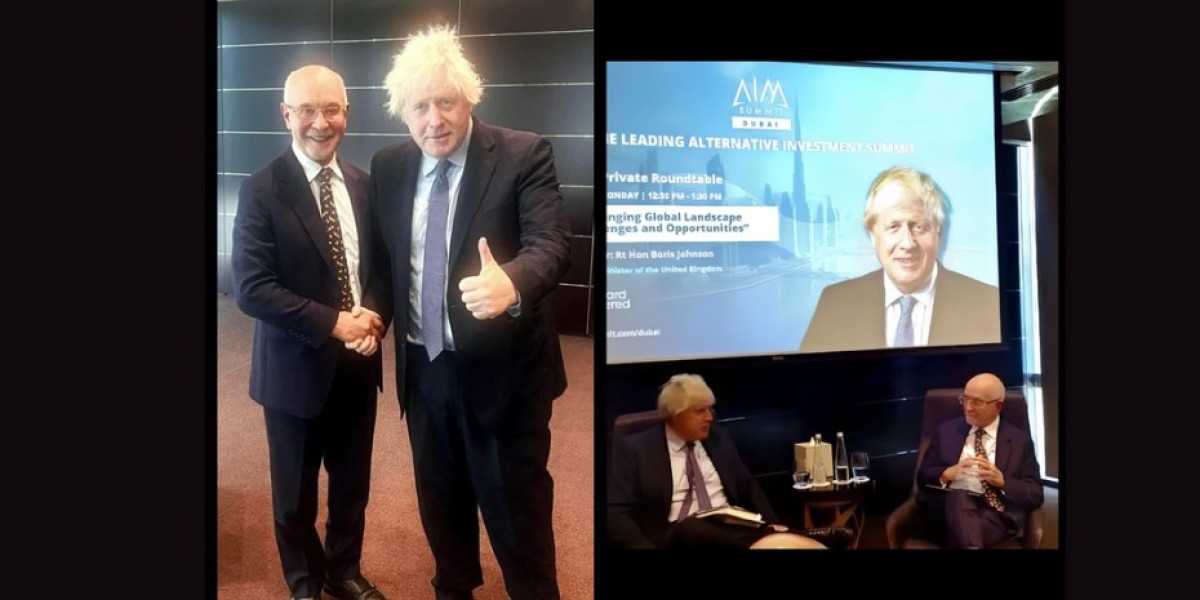The Boris Johnson AIM Summit brought together world leaders, policymakers, and financial experts to address the pressing geopolitical and economic shifts shaping today’s global order. In a rapidly changing world defined by uncertainty, the roundtable discussion featuring Boris Johnson and David Gibson-Moore shed light on critical issues ranging from global security to the Middle East crisis, economic realignment, and leadership resilience.
Boris Johnson Global Shifts Roundtable Discussion
During the Boris Johnson global shifts roundtable discussion, Johnson emphasized the importance of adaptability in a volatile environment. With rising geopolitical tensions, energy security concerns, and rapid technological changes, Johnson highlighted that leadership must go beyond rhetoric—it must anticipate disruptions and craft policies to safeguard stability.
His insights focused on how Western democracies must balance national interests with global responsibilities, particularly in the wake of post-Brexit realities, NATO’s evolving role, and the ongoing Ukraine conflict.
Boris Johnson and David Gibson-Moore Roundtable
The Boris Johnson and David Gibson-Moore roundtable emerged as a focal point of the AIM Summit, exploring how global leaders and financial experts can collaborate to address economic volatility and geopolitical uncertainty.
David Gibson-Moore’s perspective complemented Johnson’s political narrative with financial expertise, especially on how sovereign debt challenges and market instability affect both emerging and developed economies. Together, their dialogue bridged the gap between politics and economics, offering a roadmap for leaders navigating crises.
David Gibson-Moore on Middle East Crisis
A crucial theme was David Gibson-Moore on the Middle East crisis, where he outlined the region’s complex challenges—ranging from conflict and energy dependence to economic diversification. Gibson-Moore underscored that Middle Eastern stability remains a linchpin for global energy markets and international security.
His analysis pointed to the need for both regional cooperation and global diplomacy, emphasizing how visionary leadership can prevent escalating tensions and foster sustainable growth across the region.
Navigating Global Challenges with Boris Johnson
The session on navigating global challenges with Boris Johnson explored how nations must prepare for multipolarity. Johnson argued that resilience depends on cross-border collaboration, innovation, and stronger international institutions.
From climate change to supply chain disruptions, his call to action stressed that global challenges require shared solutions—moving beyond narrow national interests.
Key Takeaways from Boris Johnson Roundtable
Several key takeaways from Boris Johnson roundtable stood out:
Leadership Resilience – Nations must prepare for unpredictability through strong governance.
Geopolitical Balance – Strategic alliances like NATO and the EU remain vital for stability.
Economic Adaptation – Markets must address debt sustainability and diversification.
Middle East Diplomacy – Global energy and security stability depend on resolving regional crises.
These insights reaffirm the importance of blending political leadership with economic foresight.
David Gibson-Moore AIM Summit Leadership Insights
The David Gibson-Moore AIM Summit leadership insights provided a financial and strategic lens to global challenges. He emphasized that sovereign debt risks, inflationary pressures, and capital flows must be carefully managed in an interconnected world.
His insights serve as a reminder that economic policies cannot be separated from geopolitical realities—both are intertwined in shaping long-term global resilience.
David Gibson-Moore’s Perspective on Global Shifts
From his vantage point, David Gibson-Moore’s perspective on global shifts highlighted how emerging markets are increasingly influencing global financial trends. He noted the gradual “EM-ification” of the global economy, where emerging markets are no longer peripheral players but central drivers of growth, innovation, and capital flows.
This perspective underscored the need for inclusive global governance structures that acknowledge the rising influence of diverse economies.
Boris Johnson Insights on Global Shifts
Adding to this, Boris Johnson insights on global shifts centered on the political dimension of power transitions. Johnson argued that with China, India, and other emerging economies gaining prominence, the West must recalibrate its role without retreating into isolationism.
Instead, leadership requires building bridges—fostering cooperation while safeguarding democratic values and institutional integrity.
Boris Johnson Global Leadership Insights
Finally, Boris Johnson global leadership insights framed leadership as the art of balancing boldness with pragmatism. In an age of crises, from pandemics to geopolitical conflicts, leaders must inspire confidence, embrace innovation, and ensure that policies serve long-term prosperity.
He stressed that global leadership today is less about dominance and more about collaboration, trust, and foresight.
Conclusion
The Boris Johnson AIM Summit and the Boris Johnson and David Gibson-Moore roundtable provided an invaluable platform for examining pressing global challenges. From David Gibson-Moore on Middle East crisis to Johnson’s global leadership insights, the dialogue showcased how political strategy and economic foresight can converge to address today’s volatile landscape.
Ultimately, the summit’s message was clear: navigating global challenges requires vision, cooperation, and resilience—qualities that define leadership in the 21st century.







